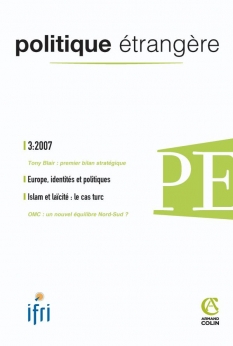
Politique étrangère n° 3/2007
Pour acheter ce numéro, contactez-nous
Recevez les numéros de l'année en cours et accédez à l'intégralité des articles en ligne.
Le projet européen n’a jamais visé à défaire les nations pour faire l’Europe, mais plutôt à transformer les relations entre États – cette signification de la construction européenne s’est perdue dans ses succès. Il est difficile de décrire aujourd’hui les composantes d’un « modèle européen ». Le sens du projet européen n’est ni civilisationnel ni moral, mais politique : c’est donc à travers des politiques concrètes que les opinions pourront se le réapproprier.
Europe has always been subject to nationally – and ideologically – based dissentions. But despite such intrinsic tensions, a specific European identity exists. Indeed, the political – rather than ethno-cultural – nature of the European project has managed to preserve national diversity. Every nation has thus been able to integrate the European idea in its national tradition. The dialectical nature of European identity also appears through the debates on the “European social model:” most political forces agree on the existence of such a model, but not on its definition. Those inherent tensions are more and more discussed in the public opinion. This is a noteworthy evolution, which reveals a growing ownership of the European project by its citizens.